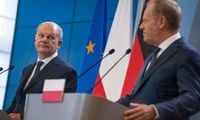In a significant diplomatic moment, outgoing German Chancellor Olaf Scholz made a farewell visit to Warsaw on April 16, 2025, to meet with Polish Prime Minister Donald Tusk. This visit, described as a routine formality, comes at a time when the Polish government is preparing for the transition to Scholz's successor, Friedrich Merz, who is expected to take office following the elections on May 6.
Scholz's visit was notably understated, with no press conference planned and the agenda limited to a simple lunch between the two leaders. This modest setup reflects the current state of Polish-German relations, which have been characterized by a lack of chemistry and differing communication styles between Tusk and Scholz. Agnieszka Łada-Konefał, a deputy director at the German Institute of Polish Affairs (DPI), remarked, "There seems to be no chemistry between Tusk and Scholz, but it’s more than that—there’s a different way of communicating that can hinder mutual understanding or even cause irritation."
The backdrop of this meeting is a complex political landscape. Scholz's party, the Social Democratic Party (SPD), lost the parliamentary elections in Germany on February 23, 2025, which has shifted the dynamics of Polish-German relations. Despite earlier hopes for a breakthrough following Tusk's coalition victory in October, these expectations have not materialized.
During the lunch, the two leaders discussed various issues, including the historical context of their countries' relations. Tusk's government has been cautious about overly aligning itself with German policies, opting instead to strengthen ties with Baltic and Scandinavian countries while reactivating dialogue with France. This approach reflects a desire to maintain a balanced foreign policy amid ongoing tensions with the ruling Law and Justice party (PiS) in Poland, which has often accused Tusk of being too pro-German.
Scholz's visit also came on the heels of several past interactions that demonstrated a willingness for cooperation. Following Tusk's inauguration in December 2023, Scholz congratulated him and expressed a desire for closer collaboration. In July 2024, after a six-year hiatus, Polish-German intergovernmental consultations resumed, leading to an action plan aimed at enhancing cooperation in various areas, including security and historical policy.
However, the relationship has faced significant challenges. Observers highlight a turning point in the summer of 2024 when Scholz rejected Polish proposals for financial support related to securing the eastern border and EU funding for arms purchases. Dr. Łada-Konefał noted, "Scholz showed a complete lack of understanding for Polish concerns and demands," which has strained trust between the two leaders. Additionally, unresolved issues surrounding reparations for Polish victims of World War II have further complicated their interactions. Tusk acknowledged that while the formal legal claims for reparations might be closed, the moral and financial compensation has yet to be addressed.
In a recent development, a recording of the farewell exchange between Tusk and Scholz sparked controversy online. In the video, Scholz thanks Tusk for his hospitality, and Tusk responds with a slight bow, which some observers interpreted as a sign of subservience. Wojciech Pawelczyk, who identified himself as a prominent critic of Tusk, questioned the appropriateness of the gesture, while others echoed sentiments of indignation, accusing Tusk of being overly deferential. Dr. Janusz Sibora, a historian of diplomatic protocol, explained that such gestures are often politically charged, emphasizing the importance of maintaining good relations despite unresolved historical grievances. He stated, "This gesture is a postcard sent more to politicians than to the public; both sides are signaling their desire for good relations."
The political context surrounding Tusk's actions is further complicated by the upcoming presidential elections in Poland. Tusk has been cautious to avoid any actions that could be perceived as pro-German, given the historical rhetoric from PiS, which has labeled him a "German agent." This has led to a careful navigation of his foreign policy engagements, with Tusk focusing on establishing a broader network of alliances, including with France and other neighboring countries.
Looking ahead, Friedrich Merz's expected ascension to the chancellorship raises questions about the future of Polish-German relations. Merz has already indicated a desire to rebuild ties with Poland and France, planning visits to both capitals shortly after taking office. Observers, including Dr. Łada-Konefał, suggest that while there are opportunities for improved relations, significant differences remain, particularly in energy policy and migration issues. Poland's commitment to developing nuclear energy contrasts sharply with Germany's decision to move away from nuclear power, which could lead to friction between the two countries.
As the political landscape evolves, both Tusk and Merz will need to navigate these complex dynamics carefully. The coming months will be pivotal, as Tusk's government concludes its term and Merz's administration seeks to establish its foreign policy direction. The potential for collaboration exists, but it will require addressing historical grievances and aligning interests on key issues.
In summary, Scholz's farewell visit encapsulates the current state of Polish-German relations—marked by cautious diplomacy, unresolved historical issues, and the looming specter of upcoming elections. With both leaders having significant political experience, the challenge will be to foster a relationship that can withstand the pressures of domestic politics while addressing the broader European context.






